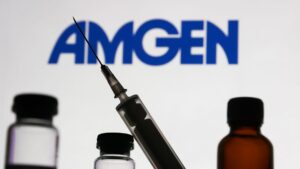Amgen’s MariTide: A New Contender in the Weight Loss Drug Market
At Extreme Investor Network, we take pride in delivering the latest and most comprehensive business news that keeps you ahead of the curve. Today, we dive into the latest developments at Amgen, a biotechnology company making waves with its promising experimental weight-loss drug, MariTide.
A Breakthrough in Obesity Treatment
On Tuesday, Amgen released encouraging data from a mid-stage trial revealing that participants with obesity lost an average of up to 20% of their weight after a year of using MariTide. Those with both obesity and Type 2 diabetes saw a weight reduction of up to 17%. Notably, the trial did not indicate any plateau in weight loss, suggesting that patients may continue to shed pounds beyond the one-year mark.
Despite these promising results, Amgen shares dipped by approximately 5% in premarket trading. Analysts had higher expectations, with many predicting a minimum weight loss of 20% to 25% in the trial outcomes. The initial excitement was palpable, as Wall Street eagerly awaited how MariTide would stack up against established giants like Novo Nordisk and Eli Lilly in a rapidly growing obesity treatment market.
Diving Deeper: Understanding MariTide’s Mechanism
What’s unique about MariTide is its innovative approach to weight loss. It is classified as a peptide antibody conjugate, combining a monoclonal antibody linked to two peptides. These peptides activate receptors of the gut hormone GLP-1, which helps regulate appetite, while the antibody blocks receptors of another hormone known as GIP. This dual action sets MariTide apart from its competitors: Eli Lilly’s Zepbound activates both GIP and GLP-1, while Novo Nordisk’s Wegovy exclusively targets GLP-1.
This novel mechanism could lead to more effective and sustainable weight loss strategies. As the obesity drug market is projected to reach a staggering $150 billion annually by the early 2030s, the stakes have never been higher.
The Road Ahead: What’s Next for Amgen?
The preliminary trial results are just the first part of a two-year study. Amgen is currently analyzing the results to refine the design of a late-stage trial. Chief Scientific Officer Jay Bradner noted that the company aims to utilize the insights gained to enhance the drug’s efficacy and patient experience.
The phase two trial involved 592 patients, exploring various dosages and regimens, including rapid and slow dose escalations. This meticulous design aims to assess the drug’s effectiveness across different patient groups, including those most affected by Type 2 diabetes.
In the next phase, Amgen will also examine the durability of weight loss after patients cease using MariTide and assess how quickly they might regain weight. Additionally, the study will test less frequent dosing methods, which could be pivotal in enhancing patient compliance and overall satisfaction.
Final Thoughts: The Competitive Landscape
While Amgen’s MariTide shows promise, it faces stiff competition. For context, late-stage studies revealed that Novo Nordisk’s Wegovy resulted in 15% weight loss over 68 weeks, while Eli Lilly’s Zepbound helped participants shed more than 22% over 72 weeks. The competitive landscape is dynamic, and Amgen will need to demonstrate that MariTide not only matches but exceeds these benchmarks to carve out a significant market share.
At Extreme Investor Network, we’ll continue to monitor Amgen’s progress and the broader implications for the weight loss drug market. As we venture deeper into this crucial development in healthcare, we invite you to stay tuned for updates that can help sculpt your investment strategies.
As the field of obesity treatments continues to evolve, the promise of drugs like MariTide serves as a potent reminder of the intersection between innovation and market opportunities. Keep following us for the insights that lead the way in business and investment trends.

